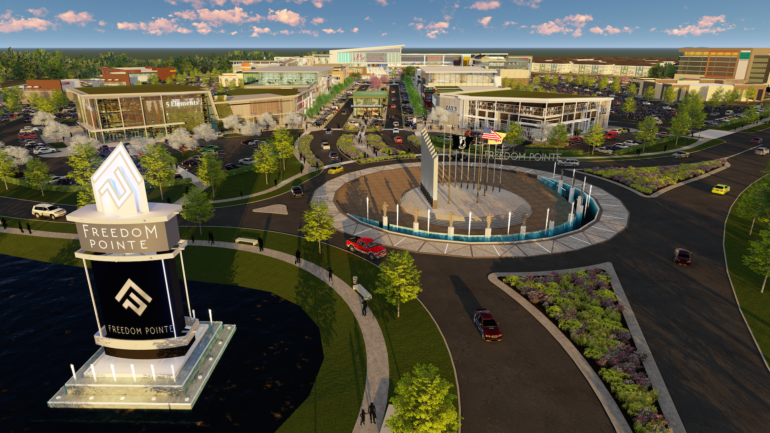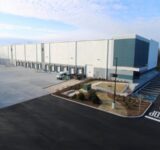Paramount Realty Services is overseeing a 90-acre redevelopment at a piece of the Fort Monmouth property in Eatontown, seeking to bring more than 300 residential units and an outdoor, walkable lifestyle center to the main entrance of the former base. Courtesy: Paramount Realty Services/Massa Multimedia Architecture PC
By Joshua Burd
A developer’s plan to create a new mixed-use gateway at the landmark Fort Monmouth property is taking shape, with the potential to break ground as soon as early next year.
The firm, Paramount Realty Services, owns about 90 acres at the main entrance of the former U.S. Army base along Route 35 in Eatontown. It has crafted a $300 million plan that includes 302 residential units and some 350,000 square feet of retail space, all meant to create an inviting, outdoor lifestyle center known as Freedom Pointe with shops, restaurants and a fitness center, plus entertainment and recreational amenities.
Paramount’s president, Maurice Zekaria, said the project would supply 95 percent of the retail space within the 1,250-acre redevelopment area, which has been divided into several parcels and assigned to different developers. But Zekaria noted that the Freedom Pointe property is the only parcel with direct access to Route 35 and visibility from the highway, including about 2,000 feet of frontage.
“For retail, you really have to be on the highway,” said Zekaria, whose firm is based in Lakewood, later adding: “It’s really mixed-use in every sense of the word and it’s very exciting.”
He expects to complete the entitlement process this fall and hopes to have a shovel in the ground by the beginning of 2018, he said. While the fort property spans three municipalities — Eatontown, Tinton Falls and Oceanport — that process is being overseen by a state agency known as the Fort Monmouth Economic Revitalization Authority, or FMERA.
The federal government closed the base in 2011 after it had served for more than 90 years as the Army’s hub for developing communications technology, intelligence and reconnaissance services. The closure dealt a blow to the local economy, but a master-planned redevelopment effort now stands to revitalize the base with some 2 million square feet of corporate, health care, technology and higher education facilities, along with 1,500 new residential units, two hotels and more than 200 acres of recreation and open space.
Paramount’s Freedom Pointe plan aims to tap into the demand for a new type of retail experience, Zekaria said, with offerings such as an upscale iPic dine-in theater, an LA Fitness and shops ranging from local mom-and-pops to national operators. He said the plan also calls for bowling, indoor golf, an ice skating rink and outdoor performance spaces.
Zekaria added that his firm has purchased three liquor licenses for the site and is in the process of obtaining at least two more. The firm is also negotiating with well-known e-commerce companies that will look to extend their reach by opening brick-and-mortar locations at the site.
Those that do commit to the project will be able to tap into a decidedly strong consumer base.
“We’re surrounded by some very strong demographic areas in terms of average household income and density,” Zekaria said. The area population is nearly 250,000, with average household incomes of $125,000.
The project will also benefit from the parcel’s access to Route 35 and the completion of a new interchange on the Garden State Parkway, 105A, which allows southbound vehicles to access the fort property.
And while that vehicle access is a critical component, Zekaria said the property will be pedestrian-friendly, with walking trails and plazas adorned with benches and water features. The design draws inspiration from a host of well-known destinations such as Crocker Park in Cleveland, MarketPlace at Lynnfield in Massachusetts and The Point in El Segundo, California.
“We visited probably 60 to 70 shopping destinations throughout the country,” he said. “And we took the best of all of them and came up with an amazing site plan.”
By the time it opens, Freedom Pointe could join other components of the Fort Monmouth redevelopment, such as the headquarters for Commvault, a global technology company, and a new health care facility at the site of a former Army clinic. And in late January, FMERA announced the sale of a former officer housing complex to RPM Development Group, which plans to spend $25 million to modernize the existing 117 units and build an additional 48 apartments nearby.










